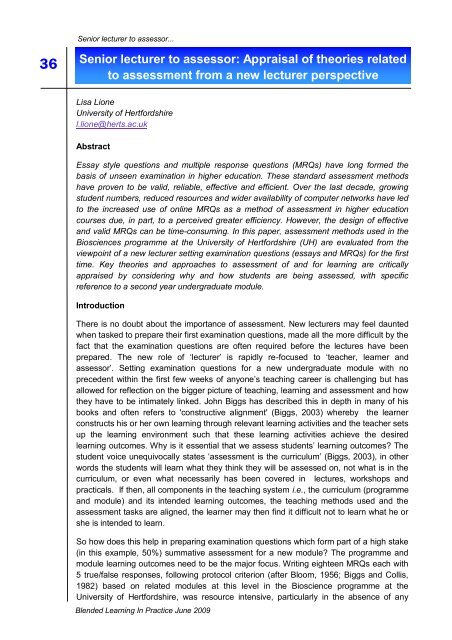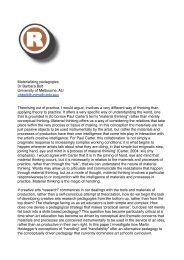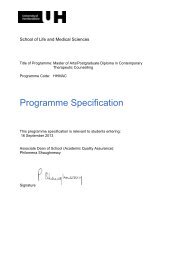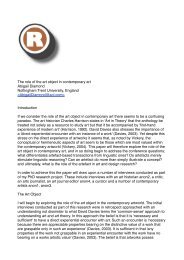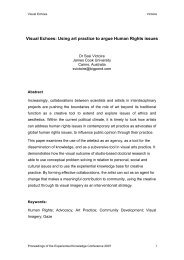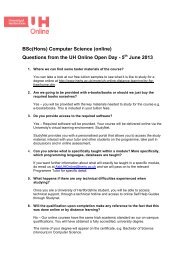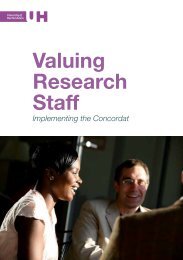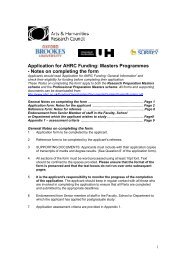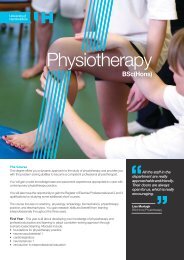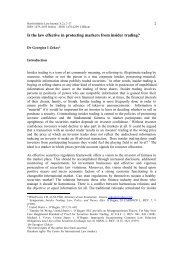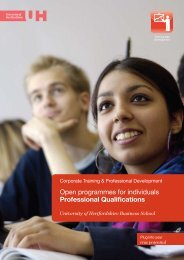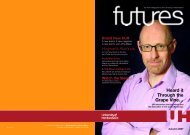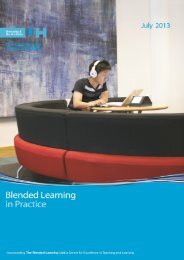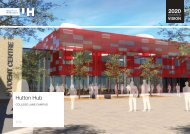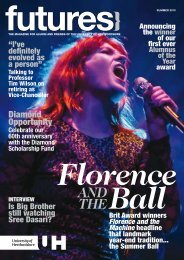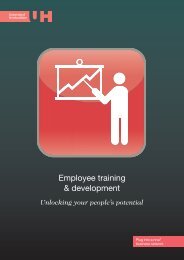June 2009 - University of Hertfordshire
June 2009 - University of Hertfordshire
June 2009 - University of Hertfordshire
Create successful ePaper yourself
Turn your PDF publications into a flip-book with our unique Google optimized e-Paper software.
Senior lecturer to assessor...<br />
36<br />
Senior lecturer to assessor: Appraisal <strong>of</strong> theories related<br />
to assessment from a new lecturer perspective<br />
Lisa Lione<br />
<strong>University</strong> <strong>of</strong> <strong>Hertfordshire</strong><br />
l.lione@herts.ac.uk<br />
Abstract<br />
Essay style questions and multiple response questions (MRQs) have long formed the<br />
basis <strong>of</strong> unseen examination in higher education. These standard assessment methods<br />
have proven to be valid, reliable, effective and efficient. Over the last decade, growing<br />
student numbers, reduced resources and wider availability <strong>of</strong> computer networks have led<br />
to the increased use <strong>of</strong> online MRQs as a method <strong>of</strong> assessment in higher education<br />
courses due, in part, to a perceived greater efficiency. However, the design <strong>of</strong> effective<br />
and valid MRQs can be time-consuming. In this paper, assessment methods used in the<br />
Biosciences programme at the <strong>University</strong> <strong>of</strong> <strong>Hertfordshire</strong> (UH) are evaluated from the<br />
viewpoint <strong>of</strong> a new lecturer setting examination questions (essays and MRQs) for the first<br />
time. Key theories and approaches to assessment <strong>of</strong> and for learning are critically<br />
appraised by considering why and how students are being assessed, with specific<br />
reference to a second year undergraduate module.<br />
Introduction<br />
There is no doubt about the importance <strong>of</strong> assessment. New lecturers may feel daunted<br />
when tasked to prepare their first examination questions, made all the more difficult by the<br />
fact that the examination questions are <strong>of</strong>ten required before the lectures have been<br />
prepared. The new role <strong>of</strong> „lecturer‟ is rapidly re-focused to „teacher, learner and<br />
assessor‟. Setting examination questions for a new undergraduate module with no<br />
precedent within the first few weeks <strong>of</strong> anyone‟s teaching career is challenging but has<br />
allowed for reflection on the bigger picture <strong>of</strong> teaching, learning and assessment and how<br />
they have to be intimately linked. John Biggs has described this in depth in many <strong>of</strong> his<br />
books and <strong>of</strong>ten refers to 'constructive alignment' (Biggs, 2003) whereby the learner<br />
constructs his or her own learning through relevant learning activities and the teacher sets<br />
up the learning environment such that these learning activities achieve the desired<br />
learning outcomes. Why is it essential that we assess students‟ learning outcomes? The<br />
student voice unequivocally states „assessment is the curriculum‟ (Biggs, 2003), in other<br />
words the students will learn what they think they will be assessed on, not what is in the<br />
curriculum, or even what necessarily has been covered in lectures, workshops and<br />
practicals. If then, all components in the teaching system i.e., the curriculum (programme<br />
and module) and its intended learning outcomes, the teaching methods used and the<br />
assessment tasks are aligned, the learner may then find it difficult not to learn what he or<br />
she is intended to learn.<br />
So how does this help in preparing examination questions which form part <strong>of</strong> a high stake<br />
(in this example, 50%) summative assessment for a new module? The programme and<br />
module learning outcomes need to be the major focus. Writing eighteen MRQs each with<br />
5 true/false responses, following protocol criterion (after Bloom, 1956; Biggs and Collis,<br />
1982) based on related modules at this level in the Bioscience programme at the<br />
<strong>University</strong> <strong>of</strong> <strong>Hertfordshire</strong>, was resource intensive, particularly in the absence <strong>of</strong> any<br />
Blended Learning In Practice <strong>June</strong> <strong>2009</strong>


